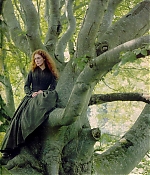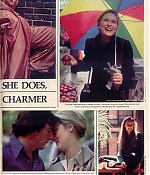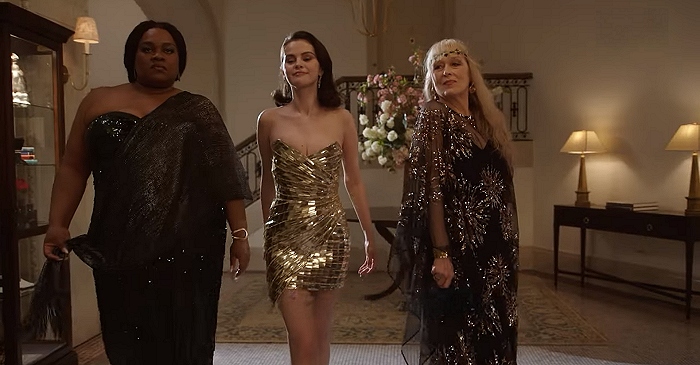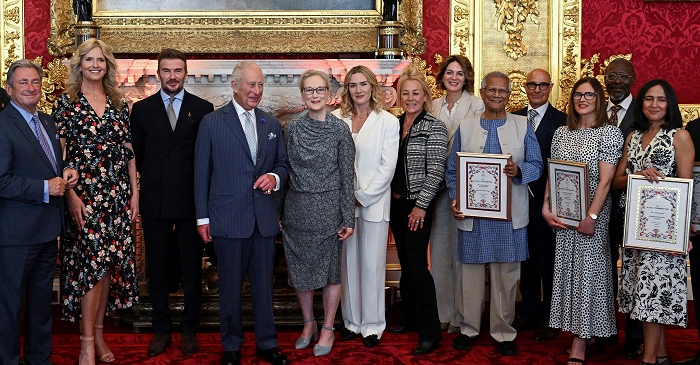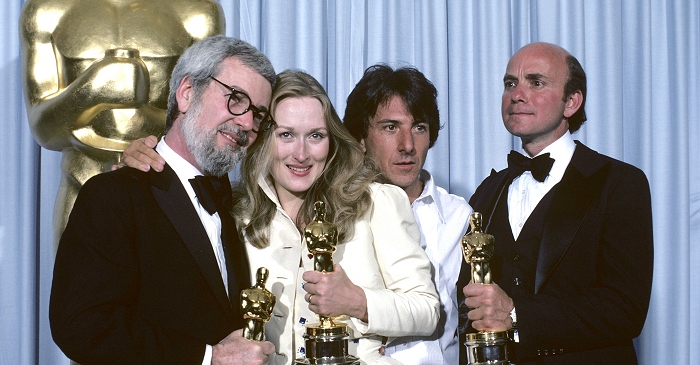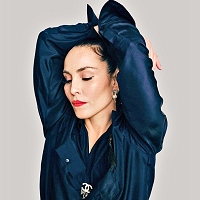|
Simply Streep is your premiere online resource on Meryl Streep's work on film, television and in the theatre - a career that has won her acclaim to be one of the world's greatest living actresses. Created in 1999, Simply Streep has built an extensive collection over the past 25 years to discover Miss Streep's body of work through thousands of photographs, articles and video clips. Enjoy your stay and check back soon.
|
|
Marvelous Meryl
LIFE Magazine ·
April 1981
· Written by Jennifer Allen
| ||

Last January she was Alice. While much of New York’s Public Theater musical in treacly cute and self-conscious self-indulgence. Meryl Streep glibed nimbly above the goop, light and sure as a stone skipping across water. In cornflower overalls and flat-footed yellow Mary Janes, the 31-year-old actress played the seven-year-old Alice as prissy and self-centered, cross and contrary and merry: greedily guzzling from the “Drink Me” bottle, then letting loose a round, unlovely burp, squirming about on the florr, like a polliwog. She played other characters as well – notably Humpty Dumpty, for which she spoke in a croaky baritone; and the imperious, bitter old White Queen. In counterpoint, Streep carried on a conversation between Alice and the Queen with liquid ease, a display of virtuosity that had audiences applauding, opera-style. Streep had struck again. The critics, as usual, thrilles her praises like suitors in a lovestruck swoon: she was “lustrous” and “amazing” and “unforgettable”. Indeed, after only seven years as a professional actress and five supporting film roles to her credit, Streep seems well on her way to canonization, as if she might sprout wings at any moment and flutter above us. Even critic Stanley Kauffmann, a habitual grump, has melted at her feet. “I’ve been waiting for years now – nastily. I guess – for Streep to make a false move,” he wrote in his “Kramer vs. Kramer” review. “I’m still waiting. So much for nastiness.” Streep has already plucked prizes that many actresses work lifetimes to win, including the New York Film Critics’ and Academy awards for “Kramer” and an Emmy for “Holocaust”. She graces the covers of our magazines; she is considered for almost every major film role. We have, it seems, lost our heads to a degree that Alice never lost hers. We suspect she’s too good to be true, to move among us lumpen mortals.
Let’s try an excercise, then. Away, dreamy transports of infatuation. Both feet on the florr, eyes facing front. Genuflecting is not allowed. If we must love her, let us at least be able to count the ways. First, Streep is a “trained” actress – a graduate of Yale Drama School, a veteran of Northeastern regional theater and of Joseph Papp’s New York Shakespeare Festival. Streep is the Real Thing, a sure and commanding stage performer. She has shone in stringent classical roles – in “The Taming of the Shrew”, “Measure for Measure”, “Henry V”, the masterpieces of Chekhov and Brecht; in works by our national playwrights, including Williams and Miller; in contemporary pieces as varied as Thomas Babe’s “Taken in Marriage” and a berserk farce by Christopher Durang and Albert Innaurato. When we find that we have an actress who really acts, we come close to bursting with proprietary pride. But Streep is hardly alone as a trained actress among her generation. In the past few years, a whole crop of young talent, nutured on the stage, intelligent, informed and committed to their craft, has come to our attention. Among them are Sigourney Weaver, Lindsay Crouse, Swoosie Kurtz, Mary Beth Hurt, Brooke Adams, Tovah Feldshuh. What has made Streep shine sooner and brighter? Beauty helps. Streep’s is a face that both the stage lights and the camera embrace with kindness. There is the fine blond hair. the long, beaked nose that adds a lovely quirk to the classic features, the porcelan skin, the much remarked upon cheekbones.
What infuses Streep’s performance on stage and on film is a feeling, an instinct, that makes her rare. Ingrid Bergman has it, so does Vanessa Redgrave. Joseph Papp, who takes credit for first bringing Streep to the attention of New York audiences in his Shakespeare Festival production and who says outright that she is “America’s finest actress,” feels that her talent is “genetic, not accumulated for aquired.” Papp calls her a “pure actor,” possessed of “total emotional involvement.” Kramer director Robert Benton also singles out her “extraordinary instinct.” Streep herself acknowledges that she relies far less on research and training than on intuition. Of her years at Yale she has said that she treasured most “the fun of it, the collective electricity. That was a secret that none of them with all their methods could take away from me.” She once referred to her performance in “Kramer” as “a form of winging it” because she did not “prepare” extensively for the part and couldn’t tap her own experience, as she is most comfortable doing. “But then,” she explained with no apologies, “I’m a very instinctual actress.” Streep is a wholly unclogged performer; nothing gets stuck on the way up from those inner recesses; the voice and face are what is transpiring inside. Her greatest strength is in showing several emotions at once, the two or three or four feelings that tumble around in our heads in tandem. Joanna’s departure at the opening of “Kramer” could easily make us hiss at the delinguent wife and mother; Streep arrests us precisely because she undercuts her abrupt exit with subtle shadows of grief and guilt. Coupled with the gift of complexity is Streep’s unembarrassed eagerness to take risks, little tested as yet in film. This is giddy, gleeful and, for many actors, the scariest side of acting. For her role in the farce “The Idiots Karamazov”, for example, she trampled on her beauty by playing a Russian translator as a half-crazed hag flying about in a wheelchair; for Tennessee William’s “27 Wagons Full of Cotton” whe strapped on prosthetic breasts and bottom, the better to play a lumbering, bovine, 170-pound floozy.
Do not bother rooting around for skeletons in Streep’s closet, for a trouble-wracked youth or otherwise messy past. Streep was a child of comfortable middle-class exurban New Yersey, with two parents (her father is a retired pharmaceutical company executive, her mother a graphic artist), two brothers, yards to play in, trees to climb. Her only cross was a long, ungainly body and a mop of frazzly hair that convinced her she was ugly. In high school she overcompensated by turning cheerleader, collecting a bevy of boyfriends, getting elected homecoming queen. Though she acted – outstandingly, her teachers recall – both in high school and at Vassar, she was not especially driven to make drama her life until she decided to go to Yale. And even at Yale she had bouts of doubt about the “seriousness” of acting as a career. But by then it was too late: Yale seemed determined to make her a star. She played 40 roles back to back during her three years there, came to New York as soon as she graduated and has not been out of work since. Says a onetime co-star: “I never did get a sense that she was aggressive. She’s not driven. I always said she’d make it just because she didn’t seem to care.” Streep is not secretive, only private. She has, after all, nothing to hife: she lives quietly in a modest SoHo loft with her husband of two and a half, sculptor Donald Gummer, and their 17-month-old baby. When she isn’t working, Streep is at home reading scripts. She is now filming Benton’s thriller “Stab”, co-starring Roy Scheider, in Manhattan. Streep’s peace is unrushed. Four years ago she took off nine months to care for lover John Cazale, a young actor who died of bone cancer, and more recently she retired for half a year to have her baby. Some theater lovers miss her stage work. “Alice” was nowhere near enough to sate her admirers. But she has said that she is continually on the lookout for “something gritty”, as she puts it, “something real funny, a real smelly part.” Streep has never been one to hurry, and in her own time she will surely keep her promise to flex her acting muscles onstage. “She’s just not the type,” says Wilford Leach, her director for “Shrew”, “to go to Hollywood and rusticate in Malibu.” In a way, of course, Streep does have all the time in the world, for we will be there, watching, just as long as she cares to share her gift with us.


Posted on September 16th, 2025
|
Posted on September 9th, 2025
|
Posted on August 12th, 2025
|
Posted on June 13th, 2025
|
Posted on May 18th, 2025
|





